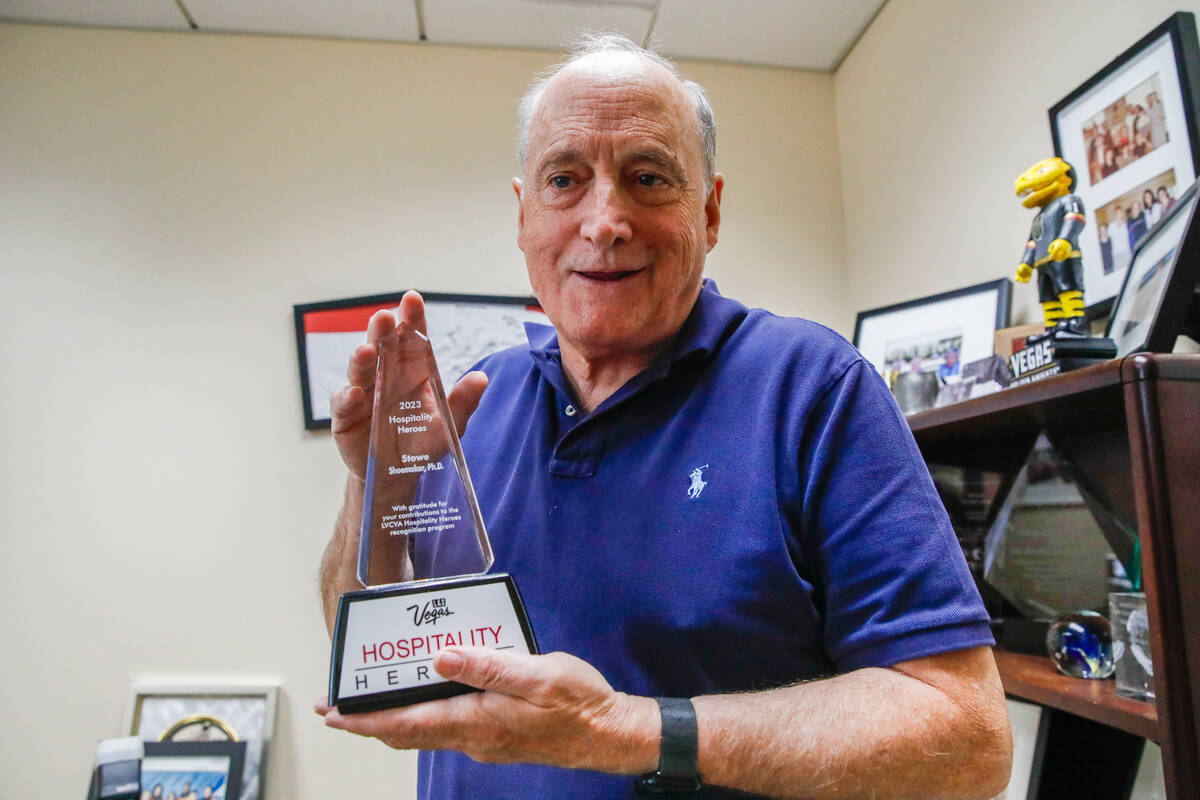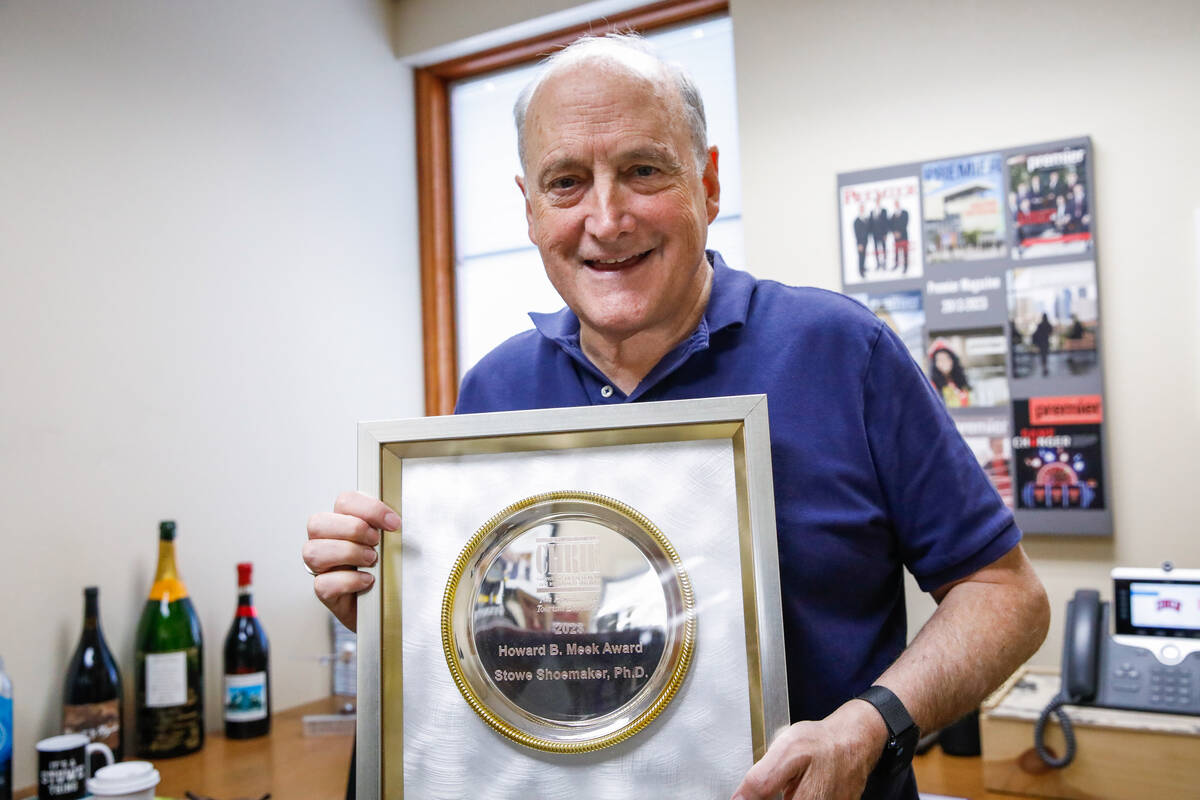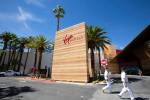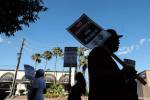Departing UNLV hospitality dean wants to avoid being Tom Brady
A senior-level class at UNLV still sticks out in Colleen Birch’s mind.
The longtime Vegas executive and chief operating officer at Fontainebleau Las Vegas had Stowe Shoemaker as her professor and he required students to read the New York Times before each class – despite it being a hospitality course, she said.
“He was a strong advocate in teaching us what was happening in the industry – not just to Vegas but more of a world awareness,” Birch said.
Shoemaker, a veteran hospitality academic, left the deanship of UNLV’s William F. Harrah College of Hospitality, during the summer after 10 years in the role. Former students and industry leaders like Birch have celebrated his tenure leading one of the nation’s best hospitality schools – but he points out that he didn’t go far. He joined the university’s foundation as a special assistant to the president.
Shoemaker recently sat down with the Review-Journal to discuss his tenure and future plans. This interview has been edited for length and clarity.
Review-Journal: You were a professor at UNLV before becoming the dean. What drew you to Vegas twice?
Shoemaker: When I was getting ready to graduate my PhD at Cornell University, someone from UNLV called the PhD office looking for one of my classmates but I happened to answer. The person said, “What are you doing after graduation?” I said I’m not sure. A few minutes later I got a call back and they asked if I could be in Las Vegas that weekend. I looked out the window, it was below zero and snowing, so I said yes. They put my wife and I up at the recently opened Luxor. My wife said, “I don’t care what they pay you, take this job.” We were here from ‘95 to 2004, and that’s when I started a lot of research in gaming, working with (Wynn Resorts) and (gaming manufacturer) IGT. My main research area was looking at customer loyalty, so I worked with hotel and airline companies on that and pricing strategy.
My wife decided to get her PhD at Texas A&M, so we were (in Texas) for eight years before we came back to Las Vegas. I was here for a year before they had a dean search. One reason I wanted to be dean was because we saw a trend of hospitality schools morphing into business schools and I felt that in order to be really successful in the hospitality industry, you really needed to understand the customer. With the support of the faculty, we did a big event around 2015 that we called Hospitality 2025 to gather all this information about what the industry was looking for and we put together a curriculum. They decided the degree, which takes about 80 credits, should have 30 credits of electives, where half would be a concentration – we have meetings and events, HR, general operations, gaming, and so on. This way as the industry changes, we can develop new concentrations. We’re building one now in the fast-casual (dining) segment.
About hospitality 2025 – how closely are things lining up to your predictions?
I think it’s really close in the sense that what we found was about the skill sets that students are going to need to be successful in the industry of the future. What are we teaching in HR and organizational behavior classes or about technology, but then how does that relate to the overall consumer experience? Right now we’re teaching a course where we work with the theater department on dinner theater. Our students put on the food and beverage side, they put on the theater side. It helps teach them about how atmosphere can create a great experience.
What were you most proud of in your tenure?
My biggest accomplishment was that, with the support of the faculty, we were able to get the curriculum changed. I’m also very proud of having built Hospitality Hall. It’s a hospitality space that doubles as a classroom. If we created a space that represents the industry – it’s crowded, it’s abuzz – and a student says they love it, we know they should be in hospitality. And I’m proud that I was able to tie the strategy of the building to the strategy of the curriculum.
What lesson have you enjoyed teaching most?
I’m what I call a frameworks person. I tried to teach the frameworks of hospitality, strategy, and competitive advantage. How all those things merge together so when people are presented with a problem, they know a theoretical framework to put it in and help them make better decisions. People say (the hospitality business) is not rocket science. I say, “Wait a minute. What does it take to launch a rocket? You get one shot to make it right. It takes a lot of people with different skill sets. It’s a long lead time. That sounds like a wedding.” It’s a science.
How did the pandemic affect the hospitality school?
Pre-pandemic, we talked a lot about how not everybody could quit their job and come get a college degree. We thought even then that we need to ensure that our program is online. We started developing it (but) when the pandemic hit, it was really focused in our mind and it really accelerated what we had been planning as a college for a long time.
Why’d you leave the deanship?
At (alma mater and rival hospitality school) Cornell, deans are 10 years. I think you reach a point where you’ve put together everything you can and I didn’t want to be Tom Brady, stayed an extra year and went downhill. I think organizations need new blood, new ideas. And, I wanted to be challenged myself.
Tell me about your new position at the UNLV Foundation.
My role is to really work with people across the university, to help them develop the story and strategy that can eventually be presented to potential donors. I was very successful in raising a lot of money for Hospitality Hall and we paid for it early. It was never just about getting money. It was about how does this new building, this new curriculum, fit in with changing lives? What’s the story around that so I want to be part of it? My new role is to really work with others across the university to help them think about their story and frame it to get more money and people excited about the school.
McKenna Ross is a corps member with Report for America, a national service program that places journalists into local newsrooms. Contact her at mross@reviewjournal.com. Follow @mckenna_ross_ on X.






























